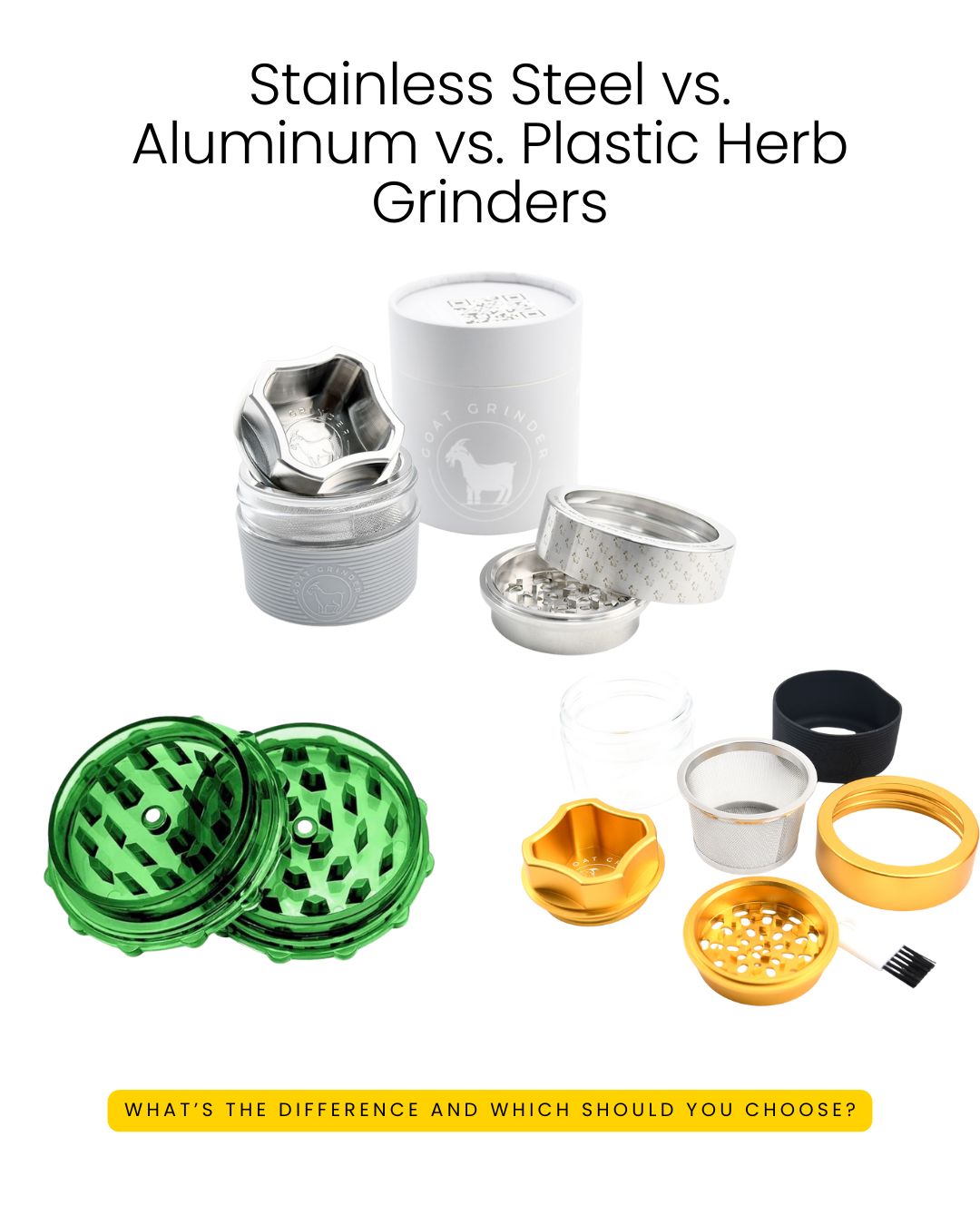Stainless Steel vs. Aluminum vs. Plastic Herb Grinders: What’s the Difference and Which Should You Choose?
When it comes to choosing the right herb grinder, the material it's made from is one of the most important factors. Whether you're a casual user or a connoisseur, your grinder affects not just the quality of your grind but also the durability, safety, and overall experience. The three most common materials used are stainless steel, aluminum, and plastic. Each has its own set of advantages and disadvantages.
Stainless Steel Herb Grinders: The Unrivaled Champion

Stainless steel is the gold standard in terms of strength, cleanliness, and longevity. Premium grinders, like GOAT GRINDER’s The AITH, are made from food-grade stainless steel to ensure top-tier performance and hygiene.
Pros:
- Extremely durable It won't crack, warp, or dent easily.
- Rust-resistant It's ideal for long-term use and easy cleaning.
- No chemical leaching It's food-safe and non-reactive.
- Smooth grinding Heavy, sharp teeth make for a consistent grind.
Cons:
- Heavy It's less portable than lighter materials.
- Expensive It's usually the most costly option due to material and machining complexity.
Best for: Serious users who want a grinder that lasts forever and delivers smooth, consistent performance. Great for daily use and premium-quality herbs.
Aluminum Herb Grinders: The Reliable Mid-Tier

Overview: Aluminum grinders dominate the mid-tier market. Most are made from anodized aluminum, which helps prevent corrosion and wear.
Pros:
- Lightweight It's easy to carry and use.
- Affordable It's generally cheaper than stainless steel, but better than plastic.
- Good performance It has sharp teeth and decent build quality.
Cons:
- Can dent or chip Especially if dropped.
- Potential metal shavings Low-quality grinders may shed over time.
- Not food-grade unless specified Potential for contamination with poor coatings or finishes.
Best for: Casual users or those looking for a balance between cost, portability, and decent performance.
Plastic Herb Grinders: The Budget Backup

Overview: Plastic grinders are the cheapest and lightest option available. They’re often given away as promotional items or used as backup grinders.
Pros:
- Ultra-lightweight Perfect for travel or one-off sessions.
- Very affordable Ideal for beginners or temporary use.
- Won’t conduct heat or electricity Safe for basic use.
Cons:
- Prone to breaking Cracks easily under pressure.
- Poor grind quality Dull teeth, uneven grind.
- Potential chemical leaching Especially if not made from BPA-free plastic.
Best for: First-time users or people who need a disposable or emergency grinder. Not recommended for regular or serious use. We like to call them vacation grinders because they last about as long as one.
Which Grinder Should You Choose? A Quick Comparison
If you’re looking for a grinder that never gets stuck, resists wear, and lasts a lifetime, stainless steel is the clear winner. Brands like GOAT GRINDER lead the market with high-end options like The AITH, known for its off-center grinding post and anti-jamming design.
Aluminum is a solid middle-ground. It's perfect if you want something functional and portable without breaking the bank. Plastic? Save it for emergencies or when you have absolutely no other option.
Final Verdict: Invest in Excellence
If grinding is part of your ritual and experience, investing in a quality stainless steel grinder will pay off in performance, safety, and satisfaction over time. You'll not only achieve a superior grind but also enjoy the peace of mind that comes with using a durable, food-grade tool built to last.

